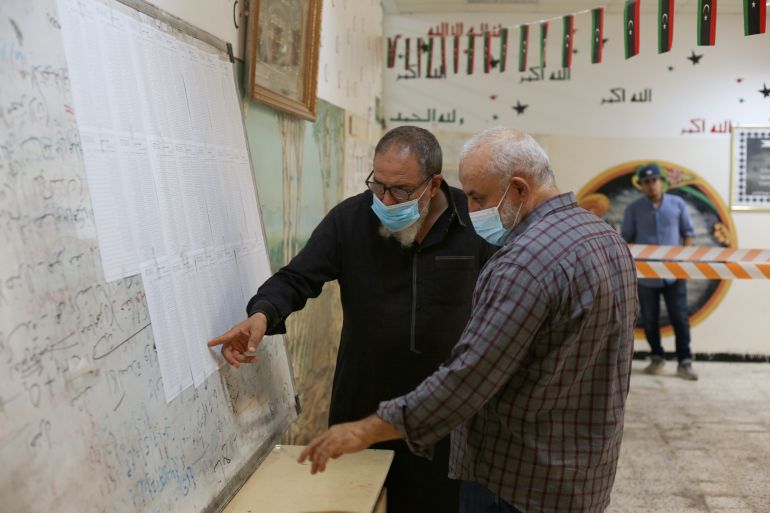Libya electoral board suggests January 24 for polls
Proposed one-month postponement comes as parliamentary committee says Friday’s vote ‘impossible’ to be held on scheduled date.

Libya’s electoral board has suggested that this week’s presidential election should be postponed by a month to January 24.
The statement by the High National Electoral Commission (HNEC) on Wednesday came after a parliamentary committee tasked with overseeing the electoral process said it was “impossible” to hold the first round of presidential polls on Friday, as originally scheduled.
Keep reading
list of 3 itemsLibyan court reinstates Saif Gaddafi as presidential candidate
Libyan political body calls for presidential vote to be delayed
“After consulting the technical, judicial and security reports, we inform you of the impossibility of holding the elections on the date of December 24, 2021, provided for by the electoral law,” Al Hadi al-Sagheer, the chairman of the committee, wrote on Wednesday to the head of parliament.
Earlier this week, the head of the HNEC had ordered the dissolution of the electoral committees nationwide, without naming a final list of candidates, in a move that effectively postponed the election.
The collapse of the United Nations-backed electoral process had been widely expected amid ongoing disputes over the rules, including the eligibility of several divisive main candidates. It comes after months of arduous preparations and international negotiations, dealing a huge blow to efforts to end 10 years of chaos in the country in the wake of a 2011 revolt that removed longtime ruler Muammar Gaddafi.
Reporting from Tripoli, Al Jazeera’s Malik Traina said that while a delay was looking increasingly likely in recent weeks, there have been disagreements between the HNEC and the parliamentary committee over who is responsible to make such an announcement. And in its latest statement, Traina noted, the HNEC was “very clear” in saying that it is the parliament “that has to set the new date in motion”.
Traina further said a postponement would necessarily resolve the issues that have plagued the long-waited election, including Libya’s two legislative sides in the country’s west and east agreeing on a constitutional framework for the vote to proceed.
“That would include who can run for election and what kind of power does a president have – these issues remain unanswered,” he added. “Even if the election is postponed until January, we might see these issues raised all over again.”
‘Risk of clashes’
Disagreements showed the limitations of a winner-takes-all presidential vote involving candidates viewed as unacceptable in large parts of the country including the son of Muammar Gaddafi and a military leader who assaulted Tripoli.
On Tuesday, the UN’s mission in the country voiced concern about the security situation in Tripoli, after rival armed groups deployed in the south of the capital, closing roads using sandbags. Images posted online in the morning showed a tank and pick-up trucks mounted with machine guns in the Fornaj district.
“The current mobilization of forces affiliated with different groups creates tensions and increases the risk of clashes that could spiral into conflict,” the mission, known as UNSMIL said in a statement, adding that all disagreements regarding political matters should be resolved through dialogue.
UNSMIL is concerned about the unfolding security situation in Tripoli. The current mobilization of forces affiliated with different groups creates tensions and increases the risk of clashes that could spiral into conflict.
👇👇👇https://t.co/fahOSh3aP0 pic.twitter.com/Yl4K2Zc5tr— UNSMIL (@UNSMILibya) December 21, 2021
Schools and the University of Tripoli closed on Tuesday as a precaution but there were no gun battles, residents said. In the afternoon, roads in Tripoli that had been closed were reopened and fewer gunmen were seen on the streets, according to reports.
Armed groups had also deployed in Tripoli’s streets last week after the unity government dismissed Abdulbasit Marwan, a senior military official backed by several of the capital’s powerful armed groups.
US ambassador to Libya Richard Norland on Wednesday “urged calm and encouraged steps that can continue to de-escalate the tense security situation”.
The embassy said in a statement that “work towards elections should be a priority, in line with strong public desires.”
The spokesman for the French government, Gabriel Attal, said France remained “committed to the smooth running of the electoral process until its end.”
Germany’s Foreign Minister Annalena Baerbock declared the ballot of “crucial importance” and vowed to work in tight collaboration with the UN to ensure it takes place.
“If elections are postponed without any kind of path forward, then anxieties will be high,” warned Amanda Kadlec, a former member of the UN panel of experts on Libya.
“I could totally envision there being a breakout of conflict at local levels that could erupt and cascade into other parts of the country or within each region,” she told AFP.
Backroom talks
Meanwhile early on Tuesday, two leading presidential candidates from western Libya, ex-Interior Minister Fathi Bashagha and former Deputy Prime Minister Ahmed Maiteeq, met Khalifa Haftar in Benghazi. Haftar is an eastern-based renegade military commander who is also seeking the presidency.
The content of their talks was not disclosed, but an adviser to Bashagha told the AFP news agency the reason for the visit was to “break down obstacles … and show that it is possible to unite”.
The meeting is the most prominent of several rounds of backroom talks over recent days between candidates, factions and foreign powers about delaying the vote and whether an interim government can meanwhile continue in power.
Those participating in the group meeting in Benghazi are aligned against the interim Prime Minister Abdul Hamid Dbeibah, who is another rival candidate.
Dbeibah had promised when he was appointed not to run for office. His opponents say he should not run in the election because he has been able to use state spending to attract votes.
Haftar’s candidacy is controversial in western areas after his 14-month assault on Tripoli from 2019-20, which destroyed much of the city. Another prominent candidate, Gaddafi’s son Saif al-Islam Gaddafi, is also unacceptable to many Libyans.